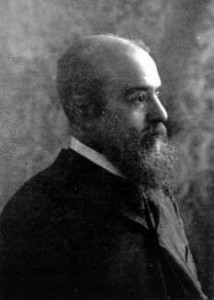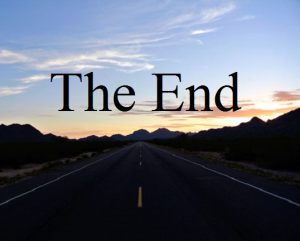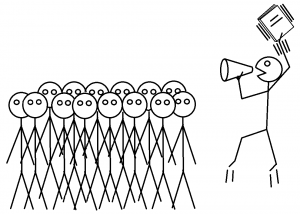Steven R. Southard's Blog, page 57
April 3, 2016
Writing Success, Thanks to Mr. Pareto
All things being equal, no two things really are equal, are they? That strange little fact, along with a rule thought up by an Italian economist, could improve your fiction writing, or at least allow you to manage your fiction-writing time and other resources better.
 Vilfredo Pareto came up with a principle now named for him—the Pareto Principle. It’s also called the “80-20 Rule” and the “Law of the Vital Few.” Pareto noted the following inequalities, or uneven distributions: only 20% of the...
Vilfredo Pareto came up with a principle now named for him—the Pareto Principle. It’s also called the “80-20 Rule” and the “Law of the Vital Few.” Pareto noted the following inequalities, or uneven distributions: only 20% of the...
March 27, 2016
Been to Utopia and Dystopia, and I prefer…
Judging from recent literature, the future looks bleak. The Hunger Games, Divergent, The Maze Runner, Delirium, Matched, Legend, and others paint visions of worlds much worse than our own.
Without question, these books sell well. Some have become movies. We readers have a fascination with dismal futures, possibly because:
They make our own present seem better by comparison; We like to imagine the end result of current downward trends; The character’s stakes are high, the conflicts larger tha...March 20, 2016
8 Rules for Writing The End
Writing the ending of your story can be as difficult as coming up with its opening lines. After all, the ending is the part that will (or should) linger in your readers’ minds. It’s important to craft an ending that satisfies, intrigues, and leaves readers hungry for your next book.
 What should you do to create a memorable and striking ending? Here are 8 rules to follow, distilled from great posts you should also read by Dee White, James V. Smith, Jr., Brian Klems, Crista Rucker, Joanna Penn,...
What should you do to create a memorable and striking ending? Here are 8 rules to follow, distilled from great posts you should also read by Dee White, James V. Smith, Jr., Brian Klems, Crista Rucker, Joanna Penn,...
March 13, 2016
Modernizing the Muses
What is the source of creativity? Why are some people creative, and others not as much? To those who aren’t, creative people can seem imbued with magical power, able to see beyond, and to make something out of nothing.
The ancient Greeks judged many such abilities to be god-given, and attributed creativity to the Muses. Later Greek mythology settled on their being nine of them, all goddesses, and all daughters of Zeus and Mnemosyne. Each was an expert in some field or group of related fields....
March 6, 2016
The 7 S’s of Your Writing Cave
You’ve heard of man-caves. Do you write in a cave? A nook? A special room dedicated to your craft? A place where all you do is write?
I’m curious about the percentage of writers who have such a place. Also, what’s the percentage of writers who don’t have a cave but wish they did?
Let’s explore the concept of writer’s caves and their characteristics. I believe there are seven features you might seek in setting up such a place. You could be looking for one, two, or any number of these aspects....
February 28, 2016
They Don’t See What You See
If you aim to be an author, you must observe the world as a writer does. You’ll write better stories if you do.
When I use the word ‘observe’ I mean it in the general sense of perceiving by one or more of the five senses (or beyond those five, even). I’ve blogged before about conveying the five senses in your stories, but here I’m referring not to your characters, but to you perceiving the real world.
 Before we get to writers, let’s discuss observation in general. While acknowledging there ar...
Before we get to writers, let’s discuss observation in general. While acknowledging there ar...
February 21, 2016
8-Fold Approach to Marketing Fiction
You’ve spent innumerable hours all alone writing your book. That’s done; the book is published. All you have to do now is switch personalities, become an extreme extrovert, and market your book. For some, that’s easy and fun. For others, not so much. This post is for those who are confused by, and a bit scared of, marketing their fiction.
 There’s plenty of advice out there, both online and in excellent books, about marketing your stories. Many websites provide long lists with scores of tasks...
There’s plenty of advice out there, both online and in excellent books, about marketing your stories. Many websites provide long lists with scores of tasks...
February 14, 2016
13 Rules for Writing Fight Scenes
Conflict is central to fiction. Not all conflict is violent, of course, but at some point, one of your stories might require a fight scene. Therefore, even if it’s distasteful to you, it’s best if you learn how to write such scenes.
 Violent interactions can take many forms beyond individual combat. These include war, rape, terror, shooting sprees, etc. This post focuses on fights between two characters, but many of my suggestions apply to other situations.
Violent interactions can take many forms beyond individual combat. These include war, rape, terror, shooting sprees, etc. This post focuses on fights between two characters, but many of my suggestions apply to other situations.
People use a variety of weapons when...
February 7, 2016
The Well-Written Villain
Villains, or antagonists, have come a long way. During the history of literature, they may have evolved even more than heroes, or protagonists. We’ll discuss that evolution, and show you how to create a well-written villain for your story.
A villain is a character opposed to the protagonist, who is usually cruel and who may be involved with crime. Not all stories have villains. The word ‘villain’ comes from the same root as ‘villa’ and once simply meant ‘farmhand.’ Only later did the word get...
January 31, 2016
Inside Each Other’s Heads
For a male writer (like me), it’s difficult to write a story in a female character’s point of view. I’ve read that it’s also difficult for female writers to get into a male character’s head and write realistic stories. Still, we’ve all read books by authors who did this very well. If others have done it; you can too.
 Advance warning: this post is full of opinions that may sound stereotypical and sexist. As a caveat, let me say the characteristics I’ll ascribe to women and men are generalizati...
Advance warning: this post is full of opinions that may sound stereotypical and sexist. As a caveat, let me say the characteristics I’ll ascribe to women and men are generalizati...



